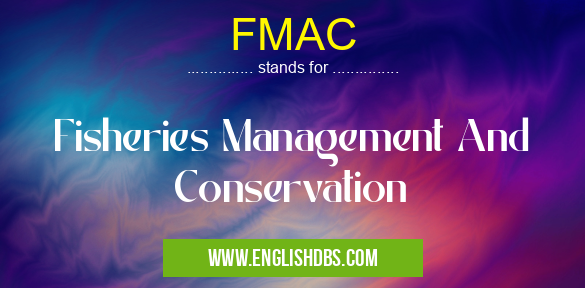What does FMAC mean in MANAGEMENT
FMAC stands for Fisheries Management And Conservation. It is an important concept in the field of marine conservation, as it encompasses the principles and practices used to ensure the long-term sustainability of fisheries resources.

FMAC meaning in Management in Business
FMAC mostly used in an acronym Management in Category Business that means Fisheries Management And Conservation
Shorthand: FMAC,
Full Form: Fisheries Management And Conservation
For more information of "Fisheries Management And Conservation", see the section below.
» Business » Management
Meaning of FMAC in Business
FMAC is a critical aspect of business operations in the fishing industry. It involves managing and conserving fish stocks to ensure their availability for future generations while also maximizing the economic benefits they provide. Effective FMAC practices help prevent overfishing, protect marine ecosystems, and support the livelihoods of those dependent on fisheries.
Key Principles of FMAC
- Sustainable Fishing: Ensuring that fishing practices do not deplete fish stocks beyond their reproductive capacity.
- Ecosystem-Based Management: Considering the impacts of fishing on the entire marine ecosystem, including non-target species, habitats, and biodiversity.
- Precautionary Approach: Implementing conservative measures to prevent irreversible damage to fish stocks, even when scientific uncertainty exists.
- Enforcement and Compliance: Establishing and enforcing regulations to prevent illegal and unsustainable fishing practices.
- Data Collection and Monitoring: Regularly gathering and analyzing data on fish stocks, fishing activities, and environmental conditions to inform management decisions.
Benefits of FMAC
- Preservation of Fish Stocks: Ensures the availability of fish resources for future generations.
- Protection of Marine Ecosystems: Minimizes the negative impacts of fishing on marine habitats and biodiversity.
- Economic Sustainability: Supports the livelihoods of fishers and businesses reliant on fisheries.
- Public Health and Food Security: Provides a safe and reliable source of food for coastal communities and beyond.
- Recreation and Tourism: Preserves marine environments for recreational activities like fishing and diving.
Essential Questions and Answers on Fisheries Management And Conservation in "BUSINESS»MANAGEMENT"
What is FMAC (Fisheries Management And Conservation)?
FMAC refers to the Fisheries Management and Conservation program, which encompasses the scientific, technical, and administrative efforts to manage and protect aquatic resources, including fish, shellfish, and their habitats. It aims to ensure sustainable use of fisheries resources and maintain the health and diversity of marine ecosystems.
What are the main objectives of FMAC?
The primary objectives of FMAC are to:
- Establish and implement management plans to ensure sustainable harvesting of fishery resources.
- Protect and conserve aquatic habitats to support healthy fish populations.
- Monitor and assess fish stocks and ecosystem health to make informed management decisions.
- Engage with stakeholders, including fishermen, scientists, and conservationists, to foster collaboration and informed decision-making.
- Promote research and innovation to improve fisheries management practices and mitigate environmental impacts.
How is FMAC implemented?
FMAC is typically implemented through a combination of regulations, policies, and educational programs. Governments, fisheries management organizations, and non-profit organizations play a role in developing and enforcing regulations that govern fishing practices, such as catch limits, gear restrictions, and closed seasons. Additionally, research and monitoring programs provide scientific data to support informed decision-making and assess the effectiveness of management measures.
What are the benefits of effective FMAC?
Effective FMAC can provide numerous benefits, including:
- Sustainable fisheries that support livelihoods and food security.
- Healthy and resilient aquatic ecosystems that provide ecological services, such as water filtration and habitat for other species.
- Reduced overfishing and depletion of fish populations.
- Conservation of biodiversity and protection of threatened or endangered species.
- Increased economic returns from sustainable fisheries management.
What are the challenges in FMAC?
FMAC faces several challenges, such as:
- Balancing the needs of stakeholders, including fishermen, conservationists, and the public.
- Managing fisheries in the face of climate change and other environmental stressors.
- Enforcing regulations and ensuring compliance.
- Addressing illegal, unreported, and unregulated (IUU) fishing.
- Obtaining sufficient scientific data to inform management decisions.
Final Words: FMAC plays a vital role in ensuring the long-term sustainability of fisheries resources and the well-being of marine ecosystems. By implementing sound FMAC practices, we can safeguard the future of our fisheries and protect the valuable resources they provide.
FMAC also stands for: |
|
| All stands for FMAC |
